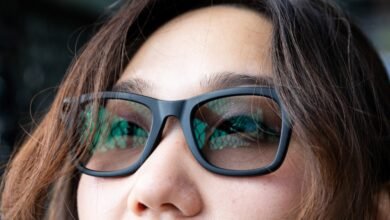Google Unveils Android XR Glasses Prototype in Magic Leap Deal

▼ Summary
– Samsung’s Galaxy XR headset launched this month, but the focus is shifting to Android XR glasses.
– Google and Magic Leap have extended their partnership for three years to develop and bring Android XR glasses to market.
– A prototype concept was unveiled, showcasing Magic Leap’s clearer displays and comfortable form factors integrated with Google’s AI and Raxium microLED technology.
– The glasses aim to keep users present in the real world while accessing multimodal AI, serving as a reference design for the Android XR ecosystem.
– Magic Leap is positioning itself as an AR ecosystem partner to support tech companies entering the AR market, rather than launching its own glasses.
While the recent launch of Samsung’s Galaxy XR headset has captured significant attention, the true excitement lies with the future of smart glasses. Google has officially confirmed an extension of its strategic partnership with Magic Leap, a move squarely aimed at accelerating the development and eventual market release of Android XR eyewear. This collaboration, originally formed in 2024 to advance augmented reality optics and manufacturing, has now been solidified with a new three-year agreement.
At a recent industry event, executives from both companies presented a joint vision. Magic Leap’s CEO Ross Rosenberg and SVP Jade Meskill were joined by Google’s Juston Payne, Senior Director of Product Management for XR, to showcase what they described as “the first prototype concept of our new work.” The presentation underscored a synergistic relationship: Magic Leap is pushing the boundaries of optical clarity and comfortable wearable designs, while Google is leveraging its advanced artificial intelligence to forge entirely new interactive experiences. Together, their stated goal is to fundamentally change how people engage with the digital and physical worlds.
Technical insights from a Magic Leap press release, as highlighted by industry observers, provide a deeper look. A key component is the integration of Google’s proprietary “Raxium microLED light engine” with Magic Leap’s optical systems. This combination is engineered to blend digital content so seamlessly into a user’s surroundings that it appears naturally part of the environment. In the demonstrated prototype, the display element of the lens is only faintly visible from certain angles, making it largely unnoticeable during use.
This specific prototype is slated for demonstration at the upcoming FII conference, where it will serve as a foundational reference design for the broader Android XR ecosystem. The live demo illustrated how the combined technologies allow users to remain fully present in their real-world environment while simultaneously accessing the vast capabilities of a multimodal AI assistant. The glasses showcased were designed to be both comfortable and stylish, challenging the conventional bulky aesthetics often associated with early-stage AR hardware.
The nature of the partnership was clarified during the presentation. Indications strongly suggest that Magic Leap is acting as a technology and manufacturing partner for Google, rather than preparing to launch its own consumer-branded glasses. The company’s press release reinforces this role, describing itself as “an AR ecosystem partner” dedicated to “supporting global technology leaders that want to enter the AR market and accelerate the production of AR glasses.”
Visually, these new prototype glasses bear a striking resemblance to the models Google has been previewing in recent months, sharing a similar foundational design and camera placement. While earlier reports suggested a Samsung-led release for a comparable device next year, this latest development confirms that the current prototypes are a direct outcome of the deepened collaboration between Google and Magic Leap.
(Source: 9to5 Google)

